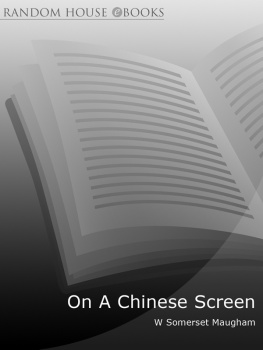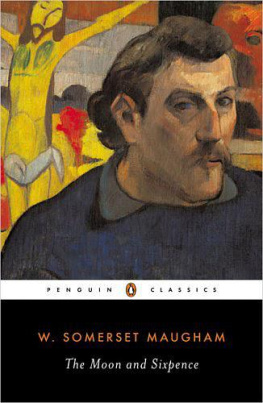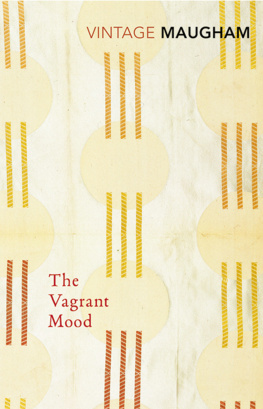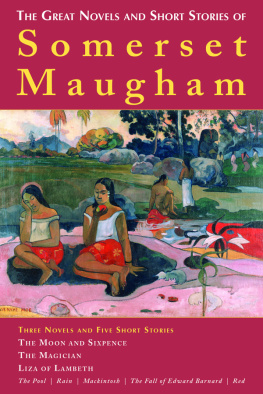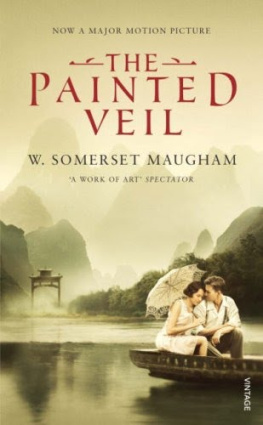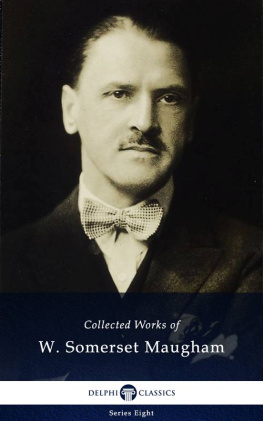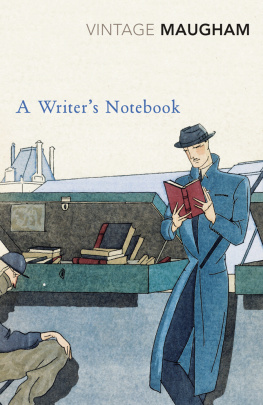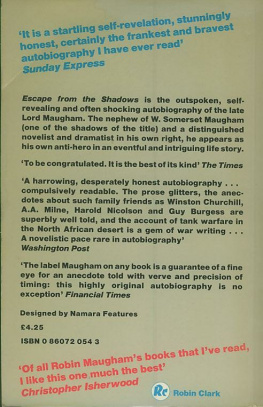W. Somerset Maugham - On A Chinese Screen
Here you can read online W. Somerset Maugham - On A Chinese Screen full text of the book (entire story) in english for free. Download pdf and epub, get meaning, cover and reviews about this ebook. year: 2010, publisher: Vintage Digital, genre: Detective and thriller. Description of the work, (preface) as well as reviews are available. Best literature library LitArk.com created for fans of good reading and offers a wide selection of genres:
Romance novel
Science fiction
Adventure
Detective
Science
History
Home and family
Prose
Art
Politics
Computer
Non-fiction
Religion
Business
Children
Humor
Choose a favorite category and find really read worthwhile books. Enjoy immersion in the world of imagination, feel the emotions of the characters or learn something new for yourself, make an fascinating discovery.
- Book:On A Chinese Screen
- Author:
- Publisher:Vintage Digital
- Genre:
- Year:2010
- Rating:5 / 5
- Favourites:Add to favourites
- Your mark:
- 100
- 1
- 2
- 3
- 4
- 5
On A Chinese Screen: summary, description and annotation
We offer to read an annotation, description, summary or preface (depends on what the author of the book "On A Chinese Screen" wrote himself). If you haven't found the necessary information about the book — write in the comments, we will try to find it.
On A Chinese Screen — read online for free the complete book (whole text) full work
Below is the text of the book, divided by pages. System saving the place of the last page read, allows you to conveniently read the book "On A Chinese Screen" online for free, without having to search again every time where you left off. Put a bookmark, and you can go to the page where you finished reading at any time.
Font size:
Interval:
Bookmark:

W. SOMERSET MAUGHAM
Screen
VINTAGE BOOKS
London
This eBook is copyright material and must not be copied, reproduced, transferred, distributed, leased, licensed or publicly performed or used in any way except as specifically permitted in writing by the publishers, as allowed under the terms and conditions under which it was purchased or as strictly permitted by applicable copyright law. Any unauthorised distribution or use of this text may be a direct infringement of the authors and publishers rights and those responsible may be liable in law accordingly.
Version 1.0
Epub ISBN 9781409090618
www.randomhouse.co.uk
Published by Vintage 2000
8 10 9 7
Copyright the Royal Literary Fund
W. Somerset Maugham has asserted his right under the Copyright, Designs and Patents Act 1988 to be identified as the author of this work
This book is sold subject to the condition that it shall not, by way of trade or otherwise, be lent, resold, hired out, or otherwise circulated without the publishers prior consent in any form of binding or cover other than that in which it is published and without a similar condition, including this condition, being imposed on the subsequent purchaser
First published in Great Britain by William Heinemann in 1922
This edition first published by Mandarin Paperbacks in 1997
Vintage
Random House, 20 Vauxhall Bridge Road, London SW1V 2SA
www.vintage-classics.info
Addresses for companies within The Random House Group Limited can be found at: www.randomhouse.co.uk/offices.htm
The Random House Group Limited Reg. No. 954009
A CIP catalogue record for this book is available from the British Library
ISBN 9780099289500
The Random House Group Limited supports The Forest Stewardship Council (FSC), the leading international forest certification organisation. All our titles that are printed on Greenpeace approved FSC certified paper carry the FSC logo. Our paper procurement policy can be found at: www.rbooks.co.uk/environment
Printed and bound in Great Britain by CPI Bookmarque, Croydon CR0 4TD
William Somerset Maugham was born in 1874 and lived in Paris until he was ten. He was educated at Kings School, Canterbury, and at Heidelberg University. He spent some time at St. Thomas Hospital with the idea of practising medicine, but the success of his first novel, Liza of Lambeth, published in 1897, won him over to letters. Of Human Bondage, the first of his masterpieces, came out in 1915, and with the publication in 1919 of The Moon and Sixpence his reputation as a novelist was established. At the same time his fame as a successful playwright and short story writer was being consolidated with acclaimed productions of various plays and the publication of The Trembling of a Leaf, subtitled Little Stories of the South Sea Islands, in 1921, which was followed by seven more collections. His other works include travel books, essays, criticism and the autobiographical The Summing Up and A Writers Notebook.
In 1927 Somerset Maugham settled in the South of France and lived there until his death in 1965.
Novels
The Moon and Sixpence
Of Human Bondage
The Narrow Corner
The Razors Edge
Cakes and Ale
The Merry-Go-Round
The Painted Veil
Catalina
Up at the Villa
Mrs Craddock
The Casuarina Tree
Christmas Holiday
Liza of Lambeth
The Magician
Theatre
Then and Now
Collected Short Stories
Collected Short Stories Vol. 1
Collected Short Stories Vol. 2
Collected Short Stories Vol. 3
Collected Short Stories Vol. 4
Ashenden
Short Stories
Far Eastern Tales
More Far Eastern Tales
Travel Writing
The Gentleman in the Parlour
Don Fernando
Literary Criticism
Ten Novels and their Authors
Points of View
The Vagrant Mood
Autobiography
The Summing Up
A Writers Notebook
You come to the row of hovels that leads to the gate of the city. They are built of dried mud and so dilapidated that you feel a breath of wind will lay them flat upon the dusty earth from which they have been made. A string of camels, heavily laden, steps warily past you. They wear the disdainful air of profiteers forced to traverse a world in which many people are not so rich as they. A little crowd, tattered in their blue clothes, is gathered about the gate and it scatters as a youth in a pointed cap gallops up on a Mongolian pony. A band of children are chasing a lame dog and they throw clods of mud at it. Two stout gentlemen in long black gowns of figured silk and silk jackets stand talking to one another. Each holds a little stick, perched on which, with a string attached to its leg, is a little bird. They have brought out their pets for an airing and in friendly fashion compare their merits. Now and then the birds give a flutter into the air, the length of the string, and return quickly to their perch. The two Chinese gentlemen, smiling, look at them with soft eyes. Rude boys cry out at the foreigner in a shrill and scornful voice. The city wall, crumbling, old and crenellated, looks like the city wall in an old picture of some Palestinish town of the Crusaders.
You pass through the gateway into a narrow street lined with shops: many of them with their elegant lattice work, red and gold, and their elaborate carving, have a peculiar ruined magnificence, and you imagine that in their dark recesses are sold all manner of strange wares of the fabulous East. A great multitude surges along the uneven narrow footwalk or in the deep-set street; and coolies, bearing heavy loads, shout for way in short sharp cries. Hawkers with gutteral sound call their wares.
And now at a sedate pace, drawn by a sleek mule, comes a Peking cart. Its hood is bright blue and its great wheels are studded with nails. The driver sits with dangling legs on a shaft. It is evening and the sun sets red behind the yellow, steep and fantastic roof of a temple. The Peking cart, the blind in front drawn down, passes silently and you wonder who it is that sits cross-legged within. Perhaps it is a scholar, all the learning of the classics at his finger-ends, bound on a visit to a friend with whom he will exchange elaborate compliments and discuss the golden age of Tang and Sung which can return no more; perhaps it is a singing girl in splendid silks and richly embroidered coat, with jade in her black hair, summoned to a party so that she may sing a little song and exchange elegant repartee with young blades cultured enough to appreciate wit. The Peking cart disappears into the gathering darkness: it seems to carry all the mystery of the East.
I really think I can make something of it, she said.
She looked about her briskly, and the light of the creative imagination filled her eyes with brightness.
It was an old temple, a small one, in the city, which she had taken and was turning into a dwelling house. It had been built for a very holy monk by his admirers three hundred years before, and here in great piety, practising innumerable austerities, he had passed his declining days. For long after in memory of his virtue the faithful had come to worship, but in course of time funds had fallen very low and at last the two or three monks that remained were forced to leave. It was weather-beaten and the green tiles of the roof were overgrown with weeds. The raftered ceiling was still beautiful with its faded gold dragons on a faded red; but she did not like a dark ceiling, so she stretched a canvas across and papered it. Needing air and sunlight, she cut two large windows on one side. She very luckily had some blue curtains which were just the right size. Blue was her favourite colour: it brought out the colour of her eyes. Since the columns, great red sturdy columns, oppressed her a little she papered them with a very nice paper which did not look Chinese at all. She was lucky also with the paper with which she covered the walls. It was bought in a native shop, but really it might have come from Sandersons; it was a very nice pink stripe and it made the place look cheerful at once. At the back was a recess in which had stood a great lacquer table and behind it an image of the Buddha in his eternal meditation. Here generations of believers had burned their tapers and prayed, some for this temporal benefit or that, some for release from the returning burden of earthly existence; and this seemed to her the very place for an American stove. She was obliged to buy her carpet in China, but she managed to get one that looked so like an Axminster that you would hardly know the difference. Of course, being hand-made, it had not quite the smoothness of the English article, but it was a very decent substitute. She was able to buy a very nice lot of furniture from a member of the Legation who was leaving the country for a post in Rome, and she got a nice bright chintz from Shanghai to make loose covers with. Fortunately she had quite a number of pictures, wedding presents and some even that she had bought herself, for she was very artistic, and these gave the room a cosy look. She needed a screen, and here and there was no help for it, she had to buy a Chinese one, but, as she very cleverly said, you might perfectly well have a Chinese screen in England. She had a great many photographs, in silver frames, one of them of a Princess of Schleswig-Holstein, and one of the Queen of Sweden, both signed, and these she put on the grand piano, for they give a room an air of being lived in. Then, having finished, she surveyed her work with satisfaction.
Font size:
Interval:
Bookmark:
Similar books «On A Chinese Screen»
Look at similar books to On A Chinese Screen. We have selected literature similar in name and meaning in the hope of providing readers with more options to find new, interesting, not yet read works.
Discussion, reviews of the book On A Chinese Screen and just readers' own opinions. Leave your comments, write what you think about the work, its meaning or the main characters. Specify what exactly you liked and what you didn't like, and why you think so.

